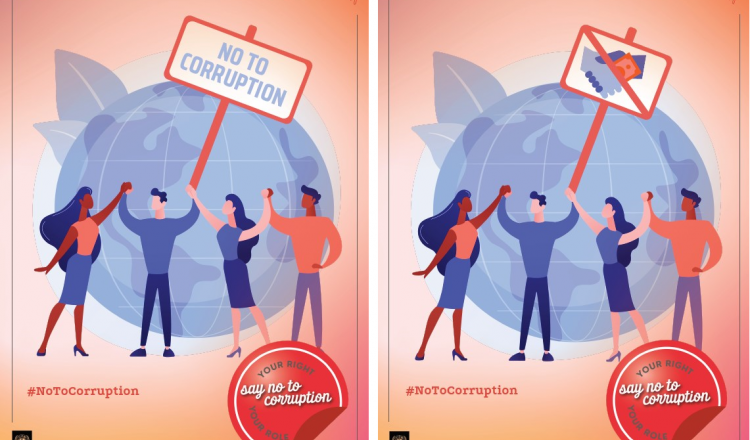Key Areas in the Fight Against Corruption
2021-12-09 08:55

Key areas in the fight against corruption
EDUCATION AND YOUTH
Corruption steals from young people and affects their ability to live in safe, just, and inclusive societies.
The world’s 1.8 billion young people have a major stake in countering corruption, as their future depends on access to equal opportunity and a level playing field. Young people have the right to demand accountability from leaders. They also play a key role in promoting integrity and can be powerful agents of change by developing innovative and impactful solutions within their communities, with support from decision makers.
SPORT AND CORRUPTION
Corruption and crime threaten the positive contribution of sport in the cultural, educational, social and economic spheres.
Governments, sport organizations and athletes need to commit to tackling corruption and crime in and through sport to overcome the impact the COVID-19 crisis has had on sport and ensure it remains a force for development and peace.
To save sport from corruption and crime it is critical that athletes are able to come forward and report approaches from match-fixers, and sport leadership act upon reports of wrongdoing.
GENDER DIMENSIONS OF CORRUPTION
Corruption steals from young people and affects their ability to live in safe, just, and inclusive societies.
The world’s 1.8 billion young people have a major stake in countering corruption, as their future depends on access to equal opportunity and a level playing field. Young people have the right to demand accountability from leaders. They also play a key role in promoting integrity and can be powerful agents of change by developing innovative and impactful solutions within their communities, with support from decision makers.
SPORT AND CORRUPTION
Corruption and crime threaten the positive contribution of sport in the cultural, educational, social and economic spheres.
Governments, sport organizations and athletes need to commit to tackling corruption and crime in and through sport to overcome the impact the COVID-19 crisis has had on sport and ensure it remains a force for development and peace.
To save sport from corruption and crime it is critical that athletes are able to come forward and report approaches from match-fixers, and sport leadership act upon reports of wrongdoing.
GENDER DIMENSIONS OF CORRUPTION
Corruption impacts women and men differently, results in the exclusion of women in decision-making roles, and perpetuates negative social stereotypes, limited economic power and educational opportunities.
There is evidence of the disproportionate impact of corruption on women during public health crises, including during the COVID-19 pandemic and its effect on the provision of education and healthcare.
Gender-sensitive whistle-blower reporting and protection systems and a victim-centred approach are of particular importance for women as the lack of protection, fear of reprisals and the level of confidentiality can negatively impact the decision to report corruption.
PRIVATE SECTOR
Doing good is good for business. Corruption damages businesses, and companies that counter corruption also strengthen their brand value, enhance their business performance, and protect their reputation.
Governments cannot counter corruption on their own and businesses can be proactive partners in reducing corruption.
To effectively prevent and counter corruption, companies need to educate and empower their employees to speak up and report corrupt practices. Education and training within businesses and along value chains, to include SMEs and other partners, is essential.
COVID-19 AND CORRUPTION
The COVID-19 crisis has created new opportunities for corruption to thrive, targeting public procurement and stimulus funds.
It is essential to include anti-corruption measures in all COVID-19 response plans. This includes safeguards in emergency legislation, public health procurement and the use of technology, all of which can strengthen recovery from the crisis.
Corruption in the context of COVID-19 increases inequality and disproportionately affects women, youth, and poor and marginalized groups.
Young people have experienced an unprecedented disruption in education, employment, social interaction, and their ability to discover the world. They now play a crucial role in building forward for a more just, equitable, resilient, and sustainable world. Countering corruption is an essential part of this endeavour.
INTERNATIONAL COOPERATION
Preventing corruption unlocks progress towards the Sustainable Development Goals, helps protect our planet, create jobs, achieve gender equality, and secure wider access to essential services such as health and education. Direct cooperation between countries’ law enforcement authorities is essential to counter corruption.
Initiatives such as the Global Operational Network of Anti-Corruption Law Enforcement Authorities (the GlobE Network), and the Stolen Asset Recovery work (the StAR Initiative) that we undertake with the World Bank are just two examples of helping achieve this.
TECHNOLOGY
Technology is an important ally of transparency and accountability. E-government systems, management of conflicts of interest through online interest and asset declarations, and technology-enabled financial investigations and forensic accounting, are all examples of ways that technology can play a part in tackling corruption.
Computerized systems also facilitate information exchange and coordination between anti-corruption institutions.









